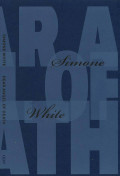We Are Here to Slow Time[we are here to slow time to break over us not considering so much
making poems but where poems come from
“Equilibrations”
create a space that escaped the grasp of power and its laws, without
entering into conflict with them yet rendering them inoperative]
come, here, Angel
this is the center of time
time’s backwater
her kerchief her bilge
come here
register
emergency
stand, here, Angel
her dust, her wind
of politics’
vented fire
ventricle left other
cracked
oar
we are in
that see
having been the arch mouth
having been the blank
through which the demon of circles
might
enter
what if
my own being
broken
is the new law
Angel, I am
dust
cover me
velvet air
blue it is not light
is not invisibilty
it is space
it is visit—
ation
UntitledHour in which I consider hydrangea, a salt or sand plant, varietal,
the question of varietals, the diet of every mother I know, 5 pounds
feels like 20, I have lost… I have lost, yes, a sense of my own
possible beauty, grown external, I externalize beauty. Beauty occurs
on the surface of plants; the sun darkens the skin of my child, he
is so small, he is beautiful (I can see; it is obvious) and everything
about him is beautiful. Because he is small, the bite of some insect
—its venom—makes his hand swell. He appears to feel nothing.
He smashes his skull against the floor. He screams. I hold him in
my lap on the kitchen floor in front of an open freezer, pressing a
pack of frozen clay against his forehead. He likes the cold. I see;
it is so obvious. Hydrangea. When I move, when I walk pushing
my child’s stroller (it is both walking and pushing or hauling,
sometimes, also, lifting; it is having another body, an adjunct
body composed of errand and weight and tenderness and no
small amount of power), I imagine I can feel this small amount of
weight, this 5 pounds like 20, interfering with the twitch of every
muscle in my body. As an object, a mother is confusing, a middle-
aged mother with little spare flesh, I feel every inch of major
muscle pulling against gravity and against the weight of my child,
now sleeping. This is the hour for thinking hydrangea. Let no man
look at me. I stop to brush the drowsy child’s little eye. His face.
He barely considers his mother. I am all around him. Why should
he consider what is all around him? Perhaps what is missing is a
subtle power of differentiation. I am in, therefore, a time of mass
apprehensions.
2 poems
Feature Date
- January 2, 2019
Series
Selected By
Share This Poem
Print This Poem
Copyright © 2019 by Simone White.
All rights reserved.
Reproduced by Poetry Daily with permission.

Simone White is the author of Dear Angel of Death, Of Being Dispersed, and House of Envy of All the World, and the chapbooks Unrest and Dolly (with Kim Thomas). Recent poems and prose have appeared in BOMB, New York Times Book Review, Harper’s, and Frieze. In 2017, she received the Whiting Award for poetry. She lives in Brooklyn.

Brooklyn, New York
Half poems, half prose, Dear Angel of Death braids intimate and public thinking about forms of togetherness. Is one woman a mother, a person in an artworld, a “black”? What imaginary and real spirits are her guides? The title essay proposes disinvestment in the idea of the Music as the highest form of what blackness “is” and includes many forms: philosophical divergence on the problem of folds for black life, a close reading of Nathaniel Mackey’s neverending novel From a Broken Bottle Traces of Perfume Still Emanate, and an impassioned defense-cum-dismissal of contemporary hip hop’s convergence with capitalism.
Praise for Simone White
[White] brings to her writing a range of legal, political, literary, lyrical, and lived knowledge, along with an incisiveness marked by candor and care.
—Maggie Nelson, Vela
I get this pinwheel relationship to wisdom & history when I read Simone White. I’m in her dream, but it’s a remarkable solidly packed one informed by the quotidian rarity of for instance a prose disquisition on lotion and skin and haircare especially in winter. Like Dana Ward’s, her work sends me searching…
—Eileen Myles
Probing the relationship between blackness and displacement, White… concludes that the creation of a personal identity does not happen in a melting pot, but rather in a compressor. As she slips in and out of forms, dialects, and registers, White demonstrates that various cultural influences collide in a single individual, producing an ever-shifting foundation.
—Publishers Weekly
Poetry Daily Depends on You
With your support, we make reading the best contemporary poetry a treasured daily experience. Consider a contribution today.



